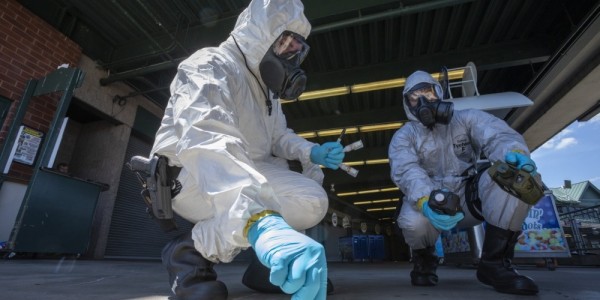

Readers can be forgiven for thinking we might be living through the end of times – or the first part of Stephen King’s novel ‘The Stand.’ With the coronavirus spreading in Asia, the Middle East, and Europe, this reporter’s most recent Google searches have included “horsemen of the apocalypse” and “pestilence” and “Friends reunion.” (The later being proof that the Antichrist has too much time on his hands.)
Your friend and humble narrator is old enough to remember the movie ‘Outbreak,’ in which the U.S. military’s response to the outbreak of a deadly, Ebola-like disease was to cordon off a small town, shoot anyone trying to escape, and then attempt to drop a daisy cutter on the helpless townspeople. (Thankfully, Cuba Gooding Jr. was able to bend the space-time continuum in an Army helicopter just enough to save the day).
Most of you are probably too young to remember that flick, but movie and TV shows have often portrayed U.S. troops as the bad guys should a virus threaten to wipe out the world. In ‘28 Weeks Later,’ for example, the U.S. military’s plan to contain the zombie virus in London includes incinerating the city’s population with flamethrowers and napalm — a bit far-fetched considering flamethrowers are no longer in the Army’s arsenal and the other services use more ecologically-friendly incendiary weapons that burn cleaner than napalm.
As a green reporter, your friend and humble narrator was heavily influenced by such depictions of the U.S. military. In fact, one of my earliest media queries to the Pentagon, back in 2005, was how the Defense Department would respond to a Bird Flu pandemic. This reporter’s questions included: 1. Would U.S. troops be armed when cordoning off infected areas; 2. Would they be allowed to fire warning shots at anyone trying to break out of the cordon; 3. Would they be allowed to keep their magazines in their weapons or would they have to store all of their ammo in their pockets?
Right now, most of you are having the exact same thought: This guy never served. You are absolutely right, for as the ensuing 15 years of covering the military has taught me, there’s no way U.S. troops could ruthlessly enforce a quarantine like that. While the military doesn’t want for firepower, it is not organized nearly well enough to go full Order 66 in a national emergency.
That doesn’t mean the Pentagon wouldn’t be part of a coronavirus response, especially considering the Defense Department has become the “easy button” for all crises foreign and domestic. Whenever the Department of Homeland Security needs money for the border wall, it uses the Pentagon as an ATM, and U.S. troops are still assisting the Border Patrol on a mission with no end in sight.
U.S. Northern Command declined to comment about what the U.S. military’s role would be to contain the coronavirus in the United States. If the past is prologue, the Defense Department’s 2014-2015 response to an Ebola outbreak in Africa illustrates how service members could assist civil authorities in a coronavirus pandemic.
At the time, nearly 3,000 U.S. troops were involved in building Ebola treatment units in Liberia and Senegal and tested medical samples, but U.S. service members did not treat patients. The U.S. military also provided logistical support and training for healthcare workers. NORTHCOM also created two medical support teams to help medical professionals inside the United States, although they were not called upon to treat any patients.
However, the Defense Department’s response ran into several complications, including problems with sharing information with other agencies, a 2016 report from the Joint Staff found.
“The U.S. military’s overreliance on classified computer networks to promulgate substantial, unclassified information complicated information sharing,” the report found. “DOD also grappled with how to effectively network with its non‐DOD partners operating on the open (non‐military) internet.”
It was not immediately known if those issues have been solved since then.
All levity aside, the coronavirus is a serious issue. Close to 3,000 people have died worldwide thus far, so your friend and humble narrator does not want to trivialize this disease in any way.
But as the Jade Helm fiasco has shown, a substantial number of Americans suffer from paranoia and they will likely be suspicious of any U.S. military involvement in stopping the coronavirus.
To disabuse conspiracy theorists of their fear of U.S. troops, this reporter turned to retired Army Lt. Gen. Russel Honoré, who led military relief efforts following Hurricane Katrina in 2005.
“They can rest assured here in America that we will follow the Constitution in that we will not violate state and local rights when it comes to responding to the virus,” Honoré told Task & Purpose. “We see foreign countries such as China – it’s still basically a communist country – they can tell 8 million people to stay indoors. I can tell you that shit will not work in New York.”
Not getting the Pentagon Run-Down? Sign up here!
Jeff Schogol covers the Pentagon for Task & Purpose. He has covered the military for 14 years and embedded with U.S. troops in Iraq and Haiti. Prior to joining T&P, he covered the Marine Corps and Air Force at Military Times. Comments or thoughts to share? Send them to Jeff Schogol via email at schogol@taskandpurpose.com or direct message @JeffSchogol on Twitter.
